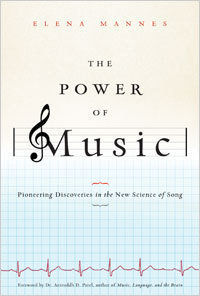The Power of Music
As Confucius wrote in The Book of Rites, “Music produces a kind of pleasure which human nature cannot do without.” Music can fuel our imagination, fill us with emotion, and inspire us to move to its beat. Music can heal and connect us. In The Power of Music: Pioneering Discoveries in the New Science of Song, author Elena Mannes demonstrates that we have only begun to understand how music works as a portal for magnifying the human experience. In her book, she cracks open the door to what Mannes calls “the Science of Song” and explores how this is music’s final frontier.
Uniquely Qualified
Elena Mannes is uniquely qualified to write on the topic of music and its effect on the body; she hails from a family of musicians who founded the Mannes College of Music. As a documentary filmmaker, Mannes also has the skill to masterfully tell stories by interviewing and capturing the thoughts, musings and expertise of scholars and musicians alike. From visiting music halls to primitive societies, her breadth of personal experience makes for fascinating reading.
Mannes begins her book with the beginning of us — our development in the womb. She shows how we start our existence surrounded by the rhythm of an ever-present pulse of blood coursing through the uterine artery alongside the landscape of sounds that filter inside with the tonal quality of being underwater. From Manne’s introduction to our physical evolution within the melodic sounds of life, we learn how our bodies stay in continuous movement, keeping harmony with the vibrations of the earth, right down to our very bones. Mannes quotes opera singer Irene Gubrud, who expresses her belief that our bodies are a symphony, and cellist Michael Fitzpatrick, who notes that the great composers masterfully tapped into the natural pulse rates of how our blood flows, our heart beats and our brain waves move. He proposes that this is the reason why “when you listen to their music, when played with the right intention, it can calm the mind, relax the body and free the emotions.”
Hard Science
In addition to delivering emotional and subjective assertions on the subject, Mannes delves into the hard science of medical research, which uses fMRI (functional magnetic resonance imaging) to enable us to see the brain’s responses when it is stimulated by music. Like never before, this imaging device reveals how the brain is affected by music as vivid colors show the motion and activity of the brain reacting to music stimuli.
Mannes also asserts the profound concept that music isn’t just sound, but also the “silence between the notes” and that “silence is part of music just as it is part of cosmic sound.” This leads to an interesting, and rather deep explanation of the connection between music and quantum field theory. This discussion is just one example of the surprising and eye-opening information Mannes delivers in her expansive book on the subject.
Whether you are a music aficionado or someone who just loves to walk, run or sleep to melodic sounds, this book is a great read! I feel vastly more intelligent and informed not only about music, but the movement, expansions, contractions and existence of the world around me from having read The Power of Music.

